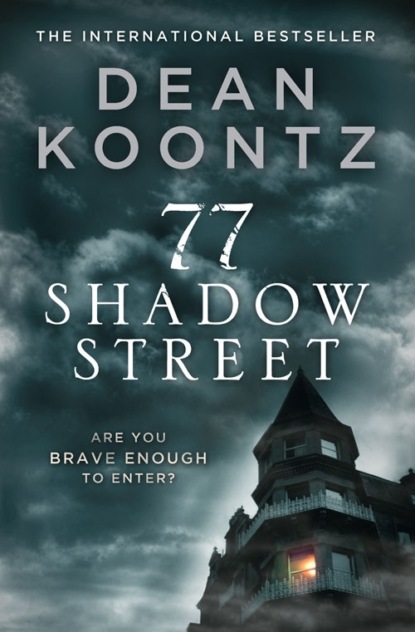По всем вопросам обращайтесь на: info@litportal.ru
(©) 2003-2025.
✖
77 Shadow Street
Автор
Год написания книги
2019
Настройки чтения
Размер шрифта
Высота строк
Поля
His bedroom had a twelve-foot-high coffered ceiling with an ornate gilded-plaster medallion in each coffer and exquisite panels of wainscoting with a gilded ground overpainted with a Japanese-style scene of dragonflies and bamboo, original to the Pendleton.
This almost daunting elegance was balanced by Winny’s toys and books, but Twyla wondered—and not for the first time—if she had made a mistake when she bought the apartment, if this was a suitable environment for a child. This was a safe building in a safe city, a privileged ambiance in which to grow up. But there weren’t many kids in the Pendleton, therefore few opportunities to have playmates. Winny had no interest in playmates; he always seemed to keep himself entertained. If he were to overcome his shyness, however, he needed to be around other kids his age, not just at school, but also playing and having fun.
Sitting on the footstool in front of her son’s armchair, Twyla said, “Honey, do you like it here in the Pendleton?”
“I don’t want to live in Nashville or L.A.,” he said at once.
“No, no,” she said. “That’s not what I mean. I don’t want to live in those places, either. I mean, maybe we could get a house in a regular neighborhood, not so fancy as this, a house with a yard, maybe near a park or something, where there’s lots of other kids. We could get a dog.”
“We could get a dog right here,” Winny said.
“Yes, we could, but it’s not as easy to take care of in the city as it would be in a suburb. Dogs like to have room to run.”
He frowned. “Anyway, you can’t just go and live in a regular neighborhood ’cause of who you are.”
“Who I am? I’m just me, just someone who writes songs. I’m nobody special.”
“You’ve been on TV sometimes. You even sang on TV that time. You sang really good.”
“I grew up in a regular neighborhood, you know. In fact it was a kind of shabby regular neighborhood.”
“Anyway, I don’t much like parks. I always get some itchy rash or something. You know how I get that rash. Or I can’t stop sneezing ’cause of the flowers and trees and all. Maybe it’s fun to go to a park in winter, you know, when everything’s all dead and frozen and covered in snow, but it’s not so great most of the year.”
She smiled. “So a park—that’s like a little piece of Hell right here on earth, huh?”
“I don’t know what Hell’s like, except probably hot. It must be worse than the park, since it’s the worst place ever. Let’s stay where we are.”
She loved Winny so much that she wanted to shout it out. She could hardly contain so much love. “I want you to be happy, kiddo.”
“I’m happy. Are you happy?”
“I’m happy with you,” she said. He was in his stocking feet. She took hold of his right foot by the toes and shook it affectionately. “Wherever I am, I’m happy if you’re there.”
He averted his eyes, embarrassed by her declaration of love. “I like it here okay. This place is cool. It’s different.”
“Anytime you want,” she said, “you could have kids from school for a sleepover or a Saturday afternoon.”
Frowning, he said, “What kids?”
“Any kids you want. Your friends. One or two, or a whole bunch, whoever.”
After a hesitation, alarmed by the thought of inviting kids home with him, Winny said, “Or you and me, maybe we could go to the park and stuff if that’s what you want.”
Rising from the footstool, she said, “You’re a gentleman. You really are.” She leaned over, kissed his forehead. “Dinner at six.”
“I’ll just sit here and read till then.”
“You have homework?”
“Did it in the car, coming back from school with Mrs. Dorfman.”
Mrs. Dorfman, the housekeeper, doubled as Winny’s chauffeur.
“Doesn’t sound like much homework for a Grace Lyman student.”
“It was a ton, but it was stuff that’s all easy for me. There wasn’t any awful math or anything.”
Twyla once told the boy that she had done well in math because it was a kind of music. Ever since, to support his determination to avoid being pushed into becoming a musician, Winny had pretended to find math difficult.
Lightning flashed, much softer than previously, but instead of glancing at the windows, the boy turned to regard the dark TV in the wall of cabinetry and bookshelves opposite his bed. Brow furrowed, his face settled into a look of wary expectation.
As thunder rolled instead of crashing like before, Twyla was overcome by intuitive motherly concern. “Is anything wrong, Winny?”
He met her eyes. “Anything like what?”
“Anything at all.”
After a hesitation, he said, “No. I’m okay.”
“You sure?”
“Yeah. I’m good. I feel good.”
“Love you, my little man.”
“Me too.” He blushed and opened one of the books in his lap.
His mom was great, the best, probably pretty much like a real angel would be, except that she said things like “my little man,” which an angel never would because an angel would know that it was an embarrassing thing for anyone to say to Winny. He was little, all right, but he wasn’t a man. He was just a skinny kid that the wind could blow over. He kept waiting to get biceps bigger than pimples, but it wasn’t happening even though he was almost nine years old. He was probably going to be a skinny kid all his life until suddenly he turned into a skinny old geezer, with nothing in between.
But his mom always meant well. She was never mean or phony. And she listened really well. He could tell her things, and she cared.
When she asked if anything was wrong, maybe he should have shared his recent weird experiences even if she would tell his dad. At dinner, maybe he would tell her about the voice that spoke to him from the weird channel on the TV.
Witness stepped to the piano in Twyla Trahern’s study as she exited the room, her back to him, unaware that he was behind her. He followed the woman to the doorway and stood on the threshold just long enough to ascertain that she was headed to the kitchen, most likely to make dinner for herself and her son.
Whatever she intended to prepare, they would not be here to eat it. Time was running out, the moment looming.
Witness wandered back toward the piano, pausing at the display shelves containing Twyla’s awards for songwriting. She had achieved remarkable success before the age of thirty. He remembered her songs because he forgot nothing. Nothing. He had owned the CD she made, on which she sang her own compositions, her voice warm and throaty.
Where he came from now, there were no songwriters, no songs, no singers, no musicians, no audiences. The morning dawned unsung, and through the day and night, the air was not once brightened by a note of Nature’s music. Among the last people whom he had killed were a man who could play the guitar with great finesse and a young girl, perhaps twelve, whose voice had been clear, sweet, angelic.
He had not been himself in those days. He had loved the law and music at one time. But then he had changed, been changed, in some ways by his intention, in other ways not. He had enjoyed music once. Now that he lived without music, he revered it.
Reverence could not keep him in Twyla Trahern’s study. It all shimmered away.
Chapter 10 (#ulink_9e020597-0b58-5665-9e57-795eeb71fb6f)
The Basement Security Room











